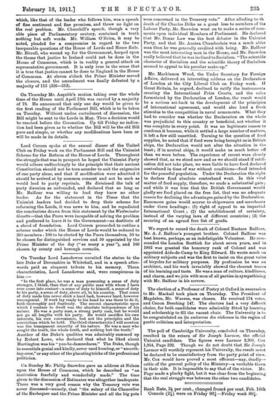Mr. Mackinnon Wood, the Under Secretary for Foreign Affairs, delivered
an interesting address on the Declaration of London at the City Liberal Club on Friday week. If Great Britain, he argued, declined to ratify the instruments creating the International Prize Courts, and the rules formulated by the Declaration of London, the result would be a serious set-back to the development of the principles of international agreement, and would also lend a fresh stimulus to the competition in naval armaments. What they had to consider was whether the Declaration on the whole was prejudicial to this country or beneficial, not whether it was complete in every point. It was no legitimate reason to condemn it because, while it settled a large number of matters, it left a few still unsettled. Turning to the question of food supplies, he noted that if food were being brought us in British ships, the Declaration would not alter the situation in the least ; if in neutral ships, it would make us much better off than we were before. The experience of recent wars clearly showed that, as we stood now and as we should stand if ratifi- cation did not take place, we were liable to have food declared contraband in time of war without conditions—food intended for the peaceful population. Under the Declaration the right to declare food absolute contraband went. In this vital matter of food supply, therefore, we made a substantial gain ; and while it was true that the British Government would gladly see food placed on the free list, that was no adequate reason for declining the advantages gained by the Declaration. Enormous gains would accrue to shipowners and merchants under three headings : (1) right of appeal to an impartial International Court ; (2) the establishment of certainty, instead of the varying laws of different countries ; (3) the securing of an agreed free list of goods.






































 Previous page
Previous page